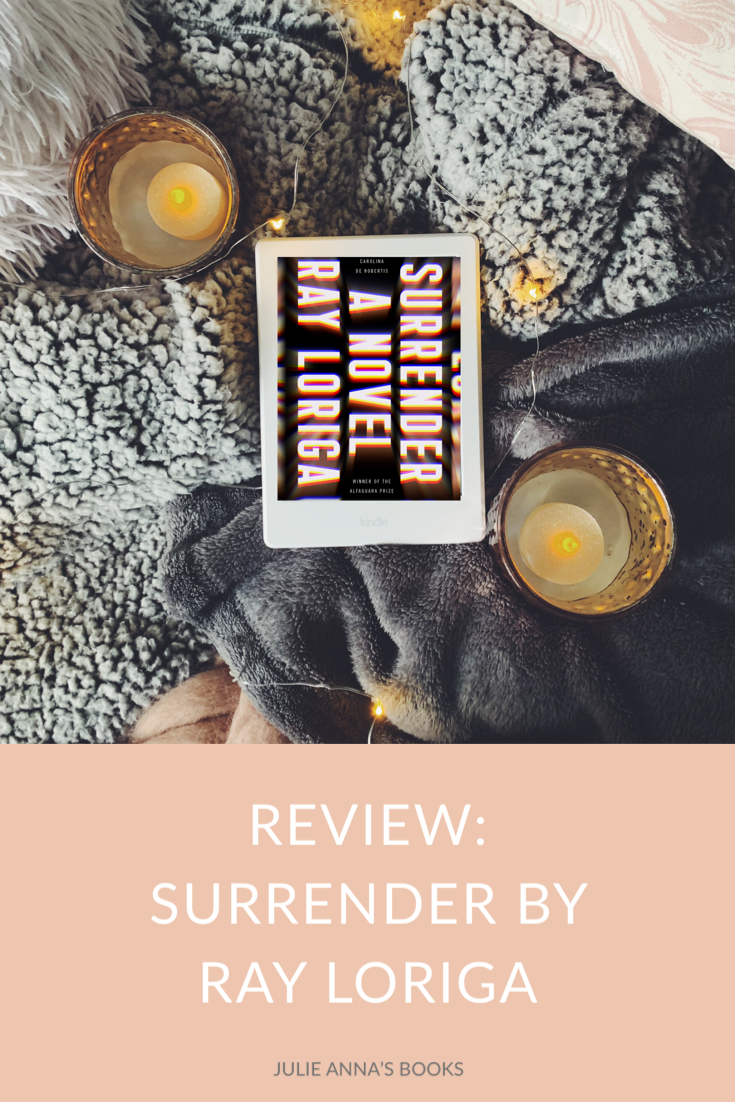Surrender by Ray Loriga
Release Date: February 25, 2020 (Translated)
Genre(s): Dystopia, Science Fiction
Publisher: Houghton Mifflin Harcourt
Pages: 224
Rating: ⭐️⭐️⭐️
Note: I was given an e-ARC of this book in exchange for an honest review. All opinions are my own.
Surrender by Ray Loriga is a dystopian sci-fi novel recently translated from its original Spanish text into English by Carolina De Robertis. It follows a couple in the midst of an ongoing war, with no information on what is going on and what to expect. But around the time they are expected to evaculate to the “transparent city”, a young mute boy appears on their property without context. Together, the three evacuate to their new home, unsure of what they are leaving behind – and what their new home will bring them.
To start, I found the translation of Surrender to be very well-done and the words flowed so smoothly throughout. The story is entirely narrated through the husband’s thoughts through a stream of consciousness. The way that the author captured the thoughts and feelings of not only the narrator, but also his wife were very real to me, and I felt for them very much when they had to evacuate.
The second half of Surrender, however, seemed to have lost that touch for me. The narrator’s descriptions begin to change in such a way that he’s merely only telling the reader directly what his thoughts and feelings are. And in a way, it does match with the events of the book, but at the same time, it reads as if the narrator’s thought process is underdeveloped. The way that the main character begins to make connections is too sudden and unnatural, and the narration in these scenes reflected that – especially when there were ways to make that connection work.
Additionally, I thought that there was a lot missing in terms of the storyline and worldbuilding. I’ve noticed in the dystopian novels that I’ve read that the cause of the dystopian world being created is sometimes left out as a stylistic choice. Often, this is done either to focus more on other aspects of the novel, such as the character’s choices in that world, or context clues to make the reader put the pieces together on what really happened.
In Surrender, however, there’s no more than a paragraph that gives context in why this war is going on. I interpreted this as another stylistic choice, as the characters are left in the dark in terms of what’s going on in the war. However, I thought it would have been much more realistic had there been at least a little more description of why the war started in the first place, and the events leading up to the lack of communication to civilians. I think this would have led to a lot more depth to the story and context behind the dystopian world that was created as a result.
But to put these points aside, Surrender was still a very intriguing, fast-paced novel that explores what makes us human – and when that is taken away from us. This book leaves a lot left to ponder on and think about, especially when it comes to the transparent city and how it really operates. Additionally, the role of the boy in this novel and his observations throughout were interesting to think about. Overall, this book puts a lot of the speculation into the reader’s hands – and your preferences on how much or little speculation you expect may impact your opinions on this book. But if you enjoy a more “soft” dystopia that focuses more on the current world than how it came to be, this will be a better fit for you.



